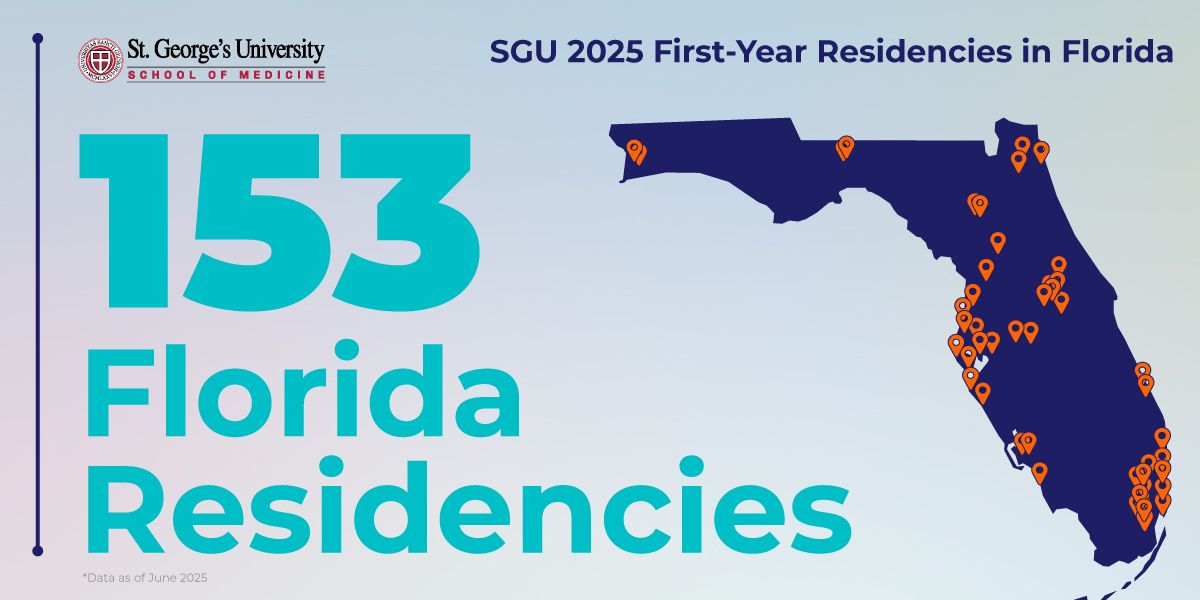More than 150 St. George’s University School of Medicine graduates will soon begin their postgraduate training at hospitals in Florida. These new doctors will help meet the state’s growing demand for more healthcare workers as its population continues to rise.
Florida is the second highest state in which SGU students obtained residency positions this year, behind New York. As residents, they will further their training in critical primary care fields such as internal medicine, pediatrics, general surgery, emergency medicine, family medicine, obstetrics and gynecology, and psychiatry. Additionally, SGU students matched in Florida in specialized fields like anesthesiology, neurology, pathology, and plastic surgery, according to internal SGU data as of June 2025.
The group will be welcomed new additions in a state that is expected to face a shortage of nearly 18,000 physicians by 2035, according to the Florida Hospital Association.
“Florida’s population is growing and SGU grads are filling the need for more MDs there, especially in primary care,” said Dr. Robert Grant, SGU’s senior associate dean of clinicals.
Graduate medical education finds its footing in Florida
Florida has fewer academic medical centers compared to other regions. As a result, many of its hospitals are developing graduate medical education (GME) programs from the ground up, explained Dr. Grant.
“This means they don’t always have longstanding ties to specific medical schools, which opens up unique opportunities for our students to secure residency positions in emerging programs,” Dr. Grant said.
Steven Paul, MD ’25, MPH ’22, is starting a family medicine residency at Florida State University College of Medicine/Lee Memorial Health System Program in Fort Myers, FL.
“I chose the Lee Memorial program because I wanted a program that can give me the best all-encompassing training to handle the variety of patient encounters I will experience in my career,” Dr. Paul said. “Additionally, the program puts an emphasis on volunteerism, global medicine, and lifestyle medicine, and these are areas that I want to engage with more as a resident.”
When Roberta Lorena Vadan, MD ’25, visited Florida State University College of Medicine/Lee Health System in Cape Coral, FL, she felt that she fit right into the internal medicine residency program.
“What stood out to me about the FSU program in Cape Coral is its balanced schedule, which allows time for both core training and electives, and the opportunity to explore various specialties while also gaining hands-on experience with diverse and complex patients,” said Dr. Vadan, who is originally from Toronto, Canada.
Several other factors make Florida an attractive destination for new doctors to develop their skills, especially when it comes to contributing meaningfully to the needs of the local community.

Retirees and Hispanic community driving Florida population growth
The Sunshine State continues to attract more people migrating within and from outside of the US. Between 2023 and 2024, Florida had the second highest population gain behind Texas, according to the US Census Bureau’s December 2024 report on US population growth.
Florida’s Hispanic population has steadily grown over the past few decades. Between 2010 and 2020, the Hispanic population in Florida grew much faster than the overall population—about 35 percent compared to nearly 15 percent, respectively, according to the state’s Office of Economic and Demographic Research. Census data shows that Hispanic population represents nearly 27 percent of Florida’s overall population.
The Hispanic community in Florida faces significant challenges when it comes to access to healthcare services, exacerbated by language barriers and lack of insurance. Addressing these obstacles and more can help close these gaps to ensure that all Floridians have access to the care and resources they need to lead healthy lives.
Nanette Varela, MD ’25, said finding out she matched in obstetrics and gynecology at Miami’s Mount Sinai Medical Center felt like she was coming full circle, as she was born at that hospital.
“Growing up in Miami as a first-generation Latina, I witnessed firsthand the vibrant diversity of our community—and the healthcare challenges that come with it,” Dr. Varela said. “Being able to provide care in a community where I understand the cultural nuances and health disparities is incredibly important to me. It was a major factor in my decision to apply for the Match in Florida.”
Miami-native Vanessa Alvarez, MD ’25, echoed that sentiment.
“I grew up with these communities around me and I am familiar with a lot of the cultural practices, beliefs, and struggles the communities face. This makes it easier to communicate with and understand my patient population. It was certainly a deciding factor during the application and match process,” said Dr. Alvarez, who is starting a family medicine residency at the University of Miami/Jackson Memorial Hospital.
Similarly, Florida has seen a steady increase in retirees.
Florida has over 5.5 million residents aged 60 and older—more than the senior populations of 20 other states combined. By 2045, that number is expected to grow to 8.4 million, making up more than 30 percent of the state’s population. This increase is driven by aging baby boomers and the state’s popularity as a home for retirees, which the Florida Department of Elder Affairs stated in its Florida State Plan on Aging 2022-2025.
“Family medicine and primary care are the first lines of treatment for many patients. Patients can be young, elderly, LGBTQ+, underinsured, or live in rural to urban settings,” said family medicine resident Dr. Paul. “Not only does the family medicine physician need to have medical knowledge of many different subfields, but we must also display cultural competence, advocate for local communities, and be someone who wants to support the patients in any aspect of their lives. This is the type of physician I want to become. That’s why I chose family medicine.”
Getting ready for residency with clinical rotations in Florida
Many SGU students who obtained residency positions in Florida were able to do clinical rotations there first. This gave them the chance to train with the communities where they would be working during residency and gauge their own comfort level living in Florida. SGU has over 85 affiliated hospital and clinical sites across the US, UK, and Canada where students can complete clinical rotations.
“Understanding the population is critical for family medicine,” Dr. Paul said. “This helped me decide on Florida. Being in Fort Myers would allow me to help a population varied in age, gender, race, politics, and education.”
Dr. Alvarez, having completed all her clinical rotations in Florida, gained a mentor through one of the attending physicians she worked with.
“It was really encouraging to meet an attending during my rotations who had graduated from the same (residency) program I eventually matched in,” she said, adding that the physician provided guidance through the residency application process and clinically challenged her as if she were a resident. “It was easily one of my favorite rotations.”
Dr. Varela said staying local for clinical rotations helped her reaffirm her commitment to eventually practicing in Florida.
The clinical rotations “allowed me to immerse myself in the unique, diverse healthcare environment of my hometown, and it gave me the opportunity to build strong relationships with mentors and colleagues who share my passion for serving this community,” she said.
“Ultimately, my time in Miami during rotations has been instrumental in shaping both my professional network and my decision to pursue residency in the state,” Dr. Varela added.
Florida provides an ideal setting for work-life balance
Warm weather year-round and a plethora of outdoor activities in Florida appeal to these new doctors as they balance the rigors of residency life.
Dr. Paul, who hails from Tampa and has family there, loves the beaches and outdoor life.
“I saw myself thriving in Florida compared to other areas,” he said. “Being closer to family is icing on the cake.”
Indeed, the optimal weather was what ultimately drew Dr. Vadan to seek residency in Florida: “The sunshine nearly every day is something that always lifts my spirits, and I know that during the challenging years of residency, this environment will help keep me grounded and motivated.”


